Olivia Nuzzi: The Last of the Real Ones
An interview with the Washington correspondent for New York Magazine, covering everything from Trump’s love of gossip to his thoughts on God to the prospect of boxers in bed
“I see everything, whether it’s Donald Trump’s ear or a political movement, connected to nature. I process everything through my sense of what’s beautiful and what’s real and what diverges from my ideas and ideals about beauty and natural order.”
During this year-long endeavor, among all the “characters” I’ve met and befriended along the way, Olivia Nuzzi stands out as a newly injected inspirational force. Our story began oddly enough — an online clash over something I disagreed with in one of her articles about RFK. But what has materialized over the past few months is a valued friendship forged amid a rather chaotic campaign trail. She’s a seasoned reporter who’s been covering DC for a long time. I’m a decade older, but considerably younger in terms of political perspective. I think she appreciates that so much of what is new to me is ancient to her — and vice versa.
Last month, as she was leaving town, she stopped by our Airbnb in Palm Beach after wrapping up time with The President. During her visit, she met my family, and we all settled in a sunroom littered with sea-themed decor to hear about her experience. Two of my boys sat in, catching snippets of the recap. When Olivia mentioned that she had brought a portrait artist on-site to paint Trump, I was instantly gripped imagining the scene. It’s the kind of detail I will likely revisit for no particular reason, years down the line. From there, I was eager to hear more about the afternoon with the artist and the storm clouds looming over Mar-a-Lago, but also to get an intimate look into Olivia’s process — the layers of detail, the decisions, and everything that goes into crafting a major cover story.
Below, she indulges insights from that day and beyond.
First off, you strike me as an exceptionally intuitive person — to the point that I worry at times if you're reading my mind when we’re together. I’m assuming plenty of people have told you this?
I think it’s just about being present and nonjudgmental. You can’t understand people if you are judging them. You have a similar quality, where people gravitate towards you and want to share things with you. I have always been like that since I was a kid. Adults would confide in me and inevitably while doing so say something like, “I don’t know why I’m telling you this.” I would be thinking, “Me neither!”
But generally I find being intuitive about other people is like being good at giving advice. I am the resident shrink for everyone in my life. I can apply these skills to others, but I can’t help myself very much, probably because I am judging myself much more than I would judge others.
Did you always want to be a writer, or did your path evolve over time?
I was a child actor, which I really hated and was exceptionally bad at. I could not summon the joy required to say something like, “More Ovaltine, please!” in a convincing way. Mostly I did advertisements for cold medicines. I could play sick well. Maybe it was something about reading other people’s words all the time — I would always want to edit scripts, even just sides for commercials, and try to improve them, make the dialogue better. I loved to write, but I became interested in the news because I loved comedy. I always watched Late Night and I would get frustrated if I didn’t understand topical jokes, so I started watching the news in service of better comprehending David Letterman. I wanted to be in on the joke. And then at a certain point I realized how interesting political language is, that it’s different than regular English, and that I had a sort of innate understanding of it. I remember when the governor of New Jersey resigned, I think I was 10 years old, I was watching the press conference with my mother and my neighbor Kristina who was a couple years older than I was, and a few seconds into his statement, I said, “He’s saying he’s gay.” And they were both insistent that he was not. Gay?! His wife was standing next to him! And a few seconds later, he said, “I am a gay American.” I felt vindicated but mostly I was curious about how and why I picked up on the meaning of what he was saying before he said it. I got involved in local politics. I applied to intern for the Democrats and Republicans, and the Democrats happened to get back to me first. I thought maybe I wanted to be a speechwriter. Around the same time I got a job, if you could call it that, writing a political column for an alt weekly in my hometown for $50 a month. And through those dual experiences I realized that I just was not ideological at all and I was more interested in understanding other people and their beliefs and motivations. I didn’t really know journalism was an option. My family was working class. I didn’t know any writers. So it wasn’t something that I planned for. It happened as so many things do — through a series of accidents and lucky breaks.
You might be the only person I know who drives more for pleasure than I do. What is it about driving that speaks to you? Does it clear your mind, or is it about discovery?
It clears my mind. It’s when I feel most American and most free. I also find that when you travel for a campaign, it’s very easy to not have a feel for the country. Zipping in and out of airports, you miss a lot. I recall you thought — correctly, probably — that I was clinically insane for driving from Los Angeles to Milwaukee for the convention (29 hours on paper, which I am proud to say I did in about 25 hours), but I really needed that journey from the desert through the canyons through the mountains to the plains to process the assassination attempt, to feel the enormous complexity of the country through its enormously complex and diverse landscape, and to do so mostly alone. I picked up my friend, the artist Isabelle Brourman, in Colorado about halfway to Milwaukee, and it was on that drive that we hatched the plan for our portraits of Donald Trump — hers with paint, mine with words.
Would you describe yourself as an optimist?
Yes. I think I have become more optimistic over time. I mean, I am more and more cynical about government and institutions of every ilk, but I am more hopeful about the human race.
A romantic?
Yes. The romantic prism through which I view the world is always present in my stories, whether or not I intend for that to be the case. I see everything, whether it’s Donald Trump’s ear or a political movement, connected to nature. I process everything through my sense of what’s beautiful and what’s real and what diverges from my ideas and ideals about beauty and natural order.
Your latest piece, a brilliantly arranged profile of Donald Trump post-shooting, made the cover of New York Magazine this week. Let’s talk about that first day: What was the atmosphere like? Did he have music playing? Did you share a meal? Were there moments of tension?
Thank you. It’s funny, I was so sure I knew what I was in for. My first interview with Trump was almost exactly 10 years ago. I’ve been interviewing him for a third of my life. I figured my task this time would be to slow him down and gently nudge him back on topic. I wanted him to tell me the story of the shooting in detail, and I knew from experience that keeping him focused can be a Herculean task. He’s always launching into asides and tumbling down rabbit holes, and it’s tempting to let him lead you astray because he is so entertaining and interesting. But the Trump I found really did not resemble any version of Trump I have known before. He was already in that mode I assumed I would have to work to get him in. He spoke slowly and in a considered way and in detail.
It strikes me that he has not been receiving in volume or content the sort of press that he wants. By which I don’t mean “good” or friendly press, though of course he does want that, but the sort of breathless coverage of his every utterance and activity that he received with his previous campaigns and his term in office. We have had a rocky relationship — he has sometimes been very unhappy with my coverage and he has let the world know, as he is inclined to do — but even after he responded poorly to our last interview, I knew he would come around. He is an optimist, and if we share one quality — besides our commitment to defying nature with blonde hair — it’s that we both believe we can win anybody over eventually. He was in a very friendly sort of avuncular posture, he really wanted this to be a “nice story,” in his words. He was welcoming and playing host. He served hors d'oeuvres and had all the time in the world. He tried very hard to emphasize what he believed I wanted to hear, which is that he respects me, which was not what I wanted to hear, but I found it interesting. I could tell there were moments when I asked a question that he would ordinarily respond to poorly, or that he would be justified in responding to poorly, and he would take a moment to think and then he would answer without defensiveness. It was interesting to observe him in this mode.
ISABELLE’s Portrait
And how did you manage to smuggle in your own portrait artist in this scenario?
Isabelle had sketched Trump during his civil and criminal trials. We were introduced at the start of the criminal trial this spring by Jerry Saltz, New York’s art critic, who has served as the divine producer of our collaboration, advising us and encouraging us along the way. Her work ran alongside my coverage and the coverage of my colleague Andrew Rice during the trial, and she published her own story about her experience, too. Trumpworld, with many members who streamed in and out of court having been drawn by Isabelle, was very aware of her work, and I think she had a lot of fans therein because of it. When we came up with the idea to pitch the campaign on this unorthodox strategy — she would paint him in real time during the interview — we both just sort of knew that it would work, that as long as the request was brought to Trump, he’d go for it.
How many times did you meet with Trump for this profile?
I met with him for our sit down at Mar-a-Lago, and then we talked on the phone for the rest of our conversations. Isabelle returned to Mar-a-Lago, and Trump sat for her a second time.
What did you wear?
I always dress pretty much the same. I travel so much and I don’t like to have to think too hard about what I pack or what I wear, so I keep it simple. I like materials that I can fold up really tiny; I don’t like having luggage or being weighed down by stuff in general. I am usually in black, high neckline, form fitting dress or pencil skirt, silk or cashmere. I wore a version of my uniform: black cashmere Gabriela Hearst dress and black Louis Vuitton stilettos.
For readers who’ve never been to Mar-a-Lago (and likely never will), how would you describe the place — both its grandeur and its quirks?
We had Trump’s comms director Steven Cheung give us a mini tour of the first floor while we were waiting for the president, and I gave him some shit about the fact that the “library bar” contains not a single book. He was like, “It’s a library bar, emphasis on bar.” Overall it’s an opulent place. Every little detail is beautiful. It’s like being inside of an old jewel box. And then you have the Trumpian oddities studding the interior, like the faux magazine covers or the campy portrait of him in tennis whites, a send up of WASP culture. He makes the most sense inside his office in Trump Tower, but he makes sense in Palm Beach, too. His gravitational force is such that he tends to define the space around him, wherever he is. He is the center.
You’ve covered Trump for over a decade now, documenting him through some of the most defining moments of his life. Looking back, it’s clear the journey hasn’t always been smooth. He once called you — and I quote — “a wack job, ‘tough’ but dumb as a rock.” Yet in your latest piece, his tone towards you seems noticeably softer. What do you think has shifted over the years?
He was selling. He really believes — and often he’s correct — that he can make anyone into a fan. At one point he said something to me about some story of mine he didn’t like. He was like, I don’t know what happened, maybe I didn’t cooperate with you on that one. I found it interesting that he sort of blamed himself. He’s a PR pro, and he understands how true it is that, as the old saying goes, if you’re not a source, you’re a target. Consciously or not, writers like everybody else are biased towards people who make their lives easier, and the best way to positively influence a story is to involve yourself in the story. That’s not to say that method is without its risks for the subject, and that’s not to say it always works, but if you don’t involve yourself you forfeit the chance that you might influence the story for the better. If you aren’t filling the space, somebody else will. He’s experienced enough to grasp that.
How have you changed as a journalist since that first interview with Trump?
The longer I do this, the more absurd it seems to me that any human being could feel confident making any kind of definitive statement about another human being, and the less sure I am that I want to do this at all. There is a certain amount of arrogance required to write about other people. This is an utter nightmare in terms of the implications for my “writing process,” such as it is, but I think the resulting work is more honest. But I am still sometimes dumb as rocks, in Trump’s defense.
You’ve said before that you’re a notoriously slow writer. What’s your writing process like for a profile of this depth — how many drafts does it typically go through before it feels right?
My mother always told me that I never crawled. I waited until I could just walk. That’s sort of what my writing process is like. I report and report until I am sure that I have something to say, and then I think until I am sure I know how I want to say it. I don’t write multiple drafts. I edit what I do write, but that’s usually more in terms of changing the structure than making changes at the sentence level. I drive everyone I work with crazy. No matter how much time I have, I am racing up against a deadline. My editors are very generous; I’d have killed me by now, if I were them.
Trump seems notably thinner and more energetic these days. Is the image of him as a Big Mac-eating Diet Coke fanatic accurate, or are those rumors overblown?
I have never sat across from him without him drinking a Diet Coke. The food he served at Mar-a-Lago was all fried. I don’t eat fried food and I don’t eat while I work so I can’t speak to it, and he didn’t touch it, either. I agree he looks much thinner and generally just much better than he did during the trial. Everyone talks about how he must be on Ozempic, but I don’t know. I don’t really buy it. I can’t imagine him volunteering to get an injection once a week. The truth is his weight has always gone up and down.
Do you ever feel the need to embellish or soften anything in your writing to appease a high-profile subject like Trump?
No matter who I am writing about, my rule is that I would never write something about you that I would not say to your face.
I assume Trump is not reading the work very carefully and certainly not in its entirety. I think he absorbs the gist of the framing through the art and the headline and maybe he skims it, or he asks his aides if it’s positive or negative, and then he absorbs what the tabloids and cable news aggregate from the piece. Usually when he’s gotten angry in the past, it’s based on something I’ve discussed while on television promoting the story, or something picked up from the story by Page Six or the Daily Mail or Fox. And you can’t totally predict which details are going to generate interest from the tabloids. Or I can’t, anyway. It’s often something small I wouldn’t have anticipated being a big deal. For instance, with this story, the tabloids went with, “Reporter Who Inspected Trump’s Ear Says It Looked Fine.” The implication, and judging by my hate mail, was that I was some sort of Blueanon shooting truther, which is absolutely not the case and certainly not anywhere close to the point of my description of his ear.
Is it true that Trump loves to gossip? How does that play into the way he interacts with journalists?
He loves to gossip, he loves show business, and he misses New York. So in my experience you can really get him going on subjects related to media, Hollywood, and New York political players. It’s also just a good way into subjects in general with him. For instance, I really wanted to ask him about the Hannibal Lecter thing. We ended up cutting this from the story for space. But my way into that was to ask him about Robert Evans and the film industry more generally, and we talked about that for a while — if I didn’t have a journalistic mandate I would have talked about that and only that for 2 hours — and then he was able to talk to me about The Silence of the Lambs and his riff about Hannibal Lecter in a pretty relaxed way.
What does he read? Novels, or strictly news?
I would love to know. If he is an avid reader, that’s a very well guarded secret. His aides bring him news clips about himself, always printed out, and he reads the Post everyday. Beyond that, it’s a mystery to me. It used to be the case that when you wrote about him he would send you a signed copy of your own article afterwards. I have one of those from early on. The headline was very rude — I was working at the Daily Beast at the time and the publication’s general position was that he could go fuck himself — so he drew an arrow to my author photo and wrote “SO NICE!” lest I get confused and think he meant the story, not me, was nice. When he said during the debate that he had never read the hundreds of pages of materials put together by Heritage about Project 2025, I am confident he was telling the truth.
You mentioned that Trump had banners turned on during the interview. What else about his phone situation stood out?
He brought an Android to the White House. Before the Android, he was holding onto a flip phone. McKay Coppins of The Atlantic wrote once that he liked the flip phone because of the way the mouthpiece curved and picked up his voice better than a smartphone, in his estimation. But there’s something funny about a president having an iPhone, I don’t know. I went to text him the article Monday and I was like…should I send an emoji? Does he speak emoji? (In the end I decided against emoji, but I’ll let you know if I send any in the future.)
Is he really behind his social media channels, or is someone else pulling the strings on all those mean tweets?
There has never been a better match in history of medium and man than Trump and Twitter. Back when he was really committed, before he had his own platform, he was the all-time greatest poster. On January 6 when he was kicked off, he starting hijacking other accounts to keep posting through it. Incredible. He used to block people and reply to tweets. Sam Nunberg and Justin McConney, aides from the Trump Org days (Nunberg only made it a few months into the 2016 campaign before he was fired) used to print out tweets for him to review in analog and decide what to respond to. I’m sure he’s fired off some of the missives himself over the years, but my understanding, based on what advisers have told me, is he drafts his statements aloud — even down to the particular punctuation and capitalization — and it’s typed up and sent by someone else.
I find Trump especially captivating in smaller settings. His rallies may be his hallmark, but in intimate gatherings, I’ve caught myself smiling while observing him. Why do you think his charm in smaller events doesn’t always translate in the mainstream media?
I think the presence of cameras changes the dynamic a lot. When he knows he’s performing for a television audience, he behaves with that in mind. He speaks differently. I do think he’s adapting to new media now, though. He’s managed to be more human-seeming recently when he’s filmed stuff with influencers and podcasters. I guess I think the mainstream media is a sort of kaleidoscope through which nobody resembles themselves. It’s not natural to have an exchange on camera that’s cut down and packaged for a general audience watching a broadcast. There’s a reason why it’s dying and getting deader everyday.
One of my favorite parts of your article was when you mentioned that Trump is “weird” — something we’ve talked about before. He seemed genuinely offended by it. Can you break down the difference you drew between “highly unusual” and “weird,” and why that distinction is so significant?
He said he’s “the most not weird person,” which I loved, but when I asked if he would agree that he is unusual, he said he would accept that label. I don’t think he’s ever quite considered himself part of the human race, perhaps until the shooting, when it did seem to occur to him. He is particular and extraordinary and unlike anyone else — that he very much agrees with. Unusual is special, if I am interpreting it in the most purely generous way. Weird, I think he interprets as meaning creepy and unlike other people in a way that is expressly negative. One pleasure, as a writer, of talking to Trump is he is as obsessed with words and their usage as I am. In a different way and filtered through his ego, of course, but he is very interested in language and choices around language, and you can sort of get into it with him about that.
I get strong Gemini vibes from Trump. Do you think he’s ever considered how his astrological tendencies play into his public persona?
I bet Marla Maples would have a lot to say about this. We should call her.
You’re an icon for pushing Trump to contemplate God in real time right in front of you. Was this something you planned, or did it naturally evolve during the conversation? Did you wake up thinking, “I’m going to ask Donald Trump about the Lord today?”
Yes, I did sort of wake up with that in mind. I was excited to talk to him about it, and I was fascinated by how he talked about it.
He faced his mortality when he had Covid during his presidency. I remember an adviser he spoke with while he was hospitalized called me to tell me he’d told them, “I could be one of the diers.” I’d never heard that term before, diers. Autocorrect doesn’t even recognize it as a legitimate word, though it is a dictionary standard. One of his brothers had died right around that time. It was a heavy moment, personally and for his presidency. But where he seemed animated by fear then, he strikes me as animated by awe now. I always figured he did not like to think much about God because to submit to God would mean giving up the story he had always told himself about his own extraordinary power, but if God can be accessed through a story in which God is a party to his extraordinary power and in fact God is so clearly on his side that He would intervene to save his life…that is an easier way for Trump to process the idea of God. He cannot explain the series of small decisions that led to his survival on his own. He is amazed and mystified by it. Why did he bring up that data at that moment, why did he ask for that chart to be projected onscreen so early in the rally when he almost never brings up the chart at all, and when he does, he brings it up towards the end? Why, why, why, why? It all amounts to a compelling case for the existence of God, as he tells it. I think it’s really quite amazing to observe someone of his age evolve in such a profound way. It’s one of the most interesting things I’ve ever seen.
Trump is one of the most divisive figures in modern history. In your experience, what are his most surprising strengths and his biggest flaws?
He is resilient. I knew that before the assassination attempt. He’d been pronounced dead in business and celebrity and politics a dozen times before, and he always found his way back from the wilderness. But I’ll admit I was shocked by his display of resilience that day — a liberal friend of mine texted me the instantly famous Evan Vucci photo of him with his fist raised a few minutes after it happened and said, “Unfortunately this is the coolest anyone has ever looked in the history of the world.” I think a lot of liberals felt that way. On January 6, for instance, I felt that the calamity revealed his character. He was being a sore loser and he was angry and succumbing to the worst of his egotism and pettiness. So many people still working for him that day were angry that he could not rise above those tendencies to lead. I thought that was who he was. Butler revealed a different facet of his character that I did not know he possessed, or it revealed a changed character; only time will tell which.
Does he have a hot temper?
That’s always been the word. He’s never yelled at me, though I have heard him yelling in the Oval loud enough that it pierced the walls to adjacent parts of the West Wing.
I couldn’t stop laughing at “Kamabla” — in fact, I’m laughing now typing it. How did that nickname go so wrong, and do you think your baffled reaction helped him realize it maybe wasn’t landing the way he thought?
They can’t all be winners. For every “Low Energy Jeb!” there are a few duds. He seems to me a little less certain right now of the correctness of his political and rhetorical choices, and I saw the Kamabla moment in our conversation as a reflection of that. When we talked about Hannibal Lecter, as another example, he asked me if people were confused by it, and I said I thought people were confused because he said “the late great Hannibal Lecter,” implying he thought perhaps that Hannibal Lecter was a real person who died and not a fictional character, and he was like, “Ohhhhh! Oh! That’s what they think? That’s what they’re confused by? No, no, I’m just being funny.” He’s very interested right now in how he’s being interpreted and whether or not what he says is working.
When you brought up Kamala’s background, Trump seemed surprisingly uninformed. How does a lapse like that happen during peak election season? Shouldn’t he and his team be well-versed on their opponents?
One of his advisers told me it’s always a struggle to get him to “do the reading” so that he is effectively prepped, but I think the other part of this is that he’s surrounded by people, a lot of them, who fear him. They don’t want to bring him bad news, they don’t want to challenge him or risk having him turn on them. They are out for themselves and preoccupied with their own preservation at his expense. That’s always the problem with political professionals. Or part of the problem, anyway.
It’s been reported that Trump is displeased with how J. D. Vance is polling, and there’s been some tension between them. Why do you think he avoided talking about Vance with you?
On the one hand, it’s true that he is uncomfortable sharing the stage in general, no matter who he is sharing it with. Until the day that he wasn’t, Pence was the perfect VP for him for this reason. If I were Trump, I would be angry about Vance, too — the first rule of VP’s is to do no harm. Vance is not quite a Sarah Palin-sized problem, but he’s up there, in terms of the negative press and new problems he has generated.
Do you think he regrets not choosing a more dynamic VP candidate like Tulsi Gabbard or RFK Jr.?
I think part of the reason he made such a big deal out of the Gabbard and Kennedy endorsements is because he is not totally satisfied with Vance, and he is able to deemphasize Vance’s importance somewhat by emphasizing instead this Unity Party. Vance made a lot of sense when the election was going to be about Joe Biden’s age. He makes less sense now, and the spotlight has revealed a lot of the flaws that some people around Trump tried to sound the alarm about, without success, during the selection process. But I also think he grasps Gabbard’s and Kennedy’s respective political value, and I think he loves the story they allow him to tell: Even some lifelong Democrats see him as a better choice in this election.
Can you recall any time when Trump admitted he was wrong? Is he capable of that kind of self-reflection?
Well, he did apologize after the Access Hollywood tape was published in 2016. He later implied that perhaps he was not actually speaking on the tape at all, that the tape may have been doctored, but before he did that he said he was sorry about it. During our conversation, when I asked him about all the neocons he invited into his administration and whom he relied on for foreign policy advice, he said that he made some mistakes. I was surprised by his willingness to volunteer that. Of course, he excused those mistakes by saying that he wasn’t a Washington person before he was elected and he didn’t know then who was smart and who was an idiot and so on. But he did say he made mistakes.
One of the most striking metaphors in your piece was about Trump as an animal: “He operates on pure instinct, driven by heightened sensory capabilities...part caveman, part computer.” It read to me like a compliment. Was it?
It wasn’t an insult. I guess it was a compliment. It was more of an expression of awe. He really is unusual! There is a lot to marvel at, in terms of how he moves through the world.
I was amused by Trump referring to himself as an artist. I’ve never heard him say that before. What did you think about that?
That was prompted by Isabelle asking him if he has ever drawn anything before. He took the question very seriously and explained that he isn’t an artist in that way, but he is an artist in the sense that he can look at something three dimensional and know what it needs. I was reminded of this scene in a documentary about him shot in the final year of his presidency. He is sitting down to be interviewed and in a few seconds he rearranges the entire shot — moving a table, taking a napkin off the table, moving a water glass — and the shot is transformed for the better after his intervention. He knows how things ought to look. Isabelle said, “So you’re a…conceiver?” And he loved that term. “Yes, a conceiver. I’m a conceiver.” He used the term again with me in conversation a few weeks later. It’s perfect — it describes exactly what he is.
You describe yourself as “unoffendable,” and it’s clear you have thick skin. After your Biden article, the left came for you hard. They even dug up old tweets from the Obama era and twisted them out of context to brand you as a racist. How do you handle that level of backlash?
I’m used to it. Depending on the story, I’m a liberal activist or I’m a conservative activist. I get written about a lot and that’s been true since the start of my career, and I learned a long time ago to not take it very personally. People are engaging with an avatar of me for their own political purposes. It’s very rarely about me.
Do you feel any resentment towards Bloomberg for scaling back PR of your series after the controversy?
I would never be so naive as to have confidence that a major media corporation would behave with even minimal courage in the face of a potential optics problem, so I am not resentful about it, just a little disappointed. Journalistic institutions — especially enormously wealthy ones like Bloomberg who have the ability to withstand crises if and when they do arise — should be in the business of defending journalists against bad faith political attacks, not encouraging those attacks by folding under the tiniest amount of pressure. In contrast, New York Magazine’s only response to the outrage over my article was to ask if I was okay and if I needed security.
On a lighter note, you know more about Trump’s self-care than most people. What’s his preferred bronzing method? And, more importantly, does he wear monogrammed pajamas, or is he more of a boxers-to-bed type of guy?
Jessica! I know he applies his own makeup, and I have seen the tiny silver cans of hairspray he uses (carried around by aides, and once stored in the powder room off the Oval). As for his preferred brand and shade, I have no idea. And as for his loungewear, I am relieved to tell you that I also have no idea.
One detail from your article that struck me as sad was the claim that Trump doesn’t have any real friends. Do you think that’s really true? If so, was it always the case?
I guess it depends on how you define friendship. This sentiment has been communicated to me over the years by several people who are publicly identified as Trump’s friends, and what they mean when they say he doesn’t really have friends is that his friendships do not resemble traditional friendships as they have experienced them. He has transactional relationships. He might share a meal or gossip, he might even do you a favor. But he is unknowable, more than most people are unknowable.
If Trump is elected again, how do you see his second term being different?
I take him at his word that he will govern in a more liberated way and in service of expanding executive authority. Whatever your ideological views, and whatever you think of Trump, I think his promises to make the executive branch more powerful than it has ever been should concern anyone skeptical of the government and skeptical of power. If he wins, whoever follows him as president will retain those expanded powers. No president returns power once it has been expanded. It is not the nature of presidents to do so, which is the whole problem.
Where do you plan on watching the election night results roll in?
I will never forget the look on his face when he ambled onstage on election night in 2016. I told him this recently: He had the same expression as Robert Redford at the end of The Candidate. Redford wins, and he is descended upon by fans and press, and as the crowd separates him from his aide, he calls out to him, “What do we do now?!” Trump looked as shocked as the rest of the world, whatever he claims about his certainty that he would pull it off. He had no clue. I have found it useful to retain that memory as I have covered his presidency and subsequent campaigns, and I expect I’ll be wherever he is on election night this time around. And I expect you and Denise will be there with me, right?
Lastly, what song represents your current state of mind?
ISABELLE BROURMAN:
When Olivia visited us after her interview, I was curious about one detail — your role in painting Trump for his portrait.
How has your view of Trump’s exterior changed over time, from sketching him in court to painting him at Mar-a-Lago?
I think the initial portraits had more of a detachment to them — the emotional investment was in the relationship I had to the project and my new environment in such a high stakes chapter in history. I was new to the space of sketching and I wanted to stay as log as I could — so the work began as something more delicate and careful. As time evolved, I grew more comfortable in blending my measured portraiture with my freed up chaotic style. The president also became more of a colleague and less of a symbol, the courtroom grew more claustrophobic as the trials wore on — more characters were involved, it became more of a marathon and less of a sprint as the presidential race grew nearer — so my own style evolved in a stroke of fate or luck, in alignment with the national conversations that became more and more urgently intertwined with the president’s presence in a courtroom as the forerunner in the nomination. Painting him at Mar-a-Lago was the inversion of court sketching, but I still had the same sensibility as far as, I am going to inhabit a traditional role as a way to slide into a traditional space, no matter how untraditional or anachronistic that role’s application is today. That adherence to what I think it would mean to actually be a portrait artist or a court artist, that’s the camp of it. In the courtroom, he is out of his domain no matter how confident he appears; he has less control. To paint him in his domain was to complete the other half of the portrait. He was laid back, approachable to a certain extent, there was less tension between himself and his environment, so he almost became his environment. He looks like Mar-a-Lago: The details with the environment around him, the interior and the exterior of his “castle” are merged with his representation, almost like a Bauhaus inside-outside philosophy. I never approached it with a direction; I was open to whatever he would present to me. A lot of confidence and prep is involved in getting mentally clear before doing something so athletic like this. I ask not to be spoken to the day of, and the night before I do medial things and try not to form expectations or anticipations. I don’t get excited, I just clear out of myself so that I can occupy my role as a professional and so that the experience and information he offers me in our interaction can settle in its space. I have also viewed my role as an artist differently now, thanks to my time sketching him. The American imagination is what fuels change and innovation. We need that in our country, we need new information, new ways of understanding something we have been fed for years and years. I wanted to see it all with my own eyes, and always liberate myself if I got too set in a routine with my work. I found the door; let’s see how far I can go.
What was it like creating his likeness in real time, and what features stood out to you as most important to capture?
It is a physical performance. Creating his likeness in real time is a mixture of gesture and measurement — to create his likeness you have to let it consume you. I see it as a meditation exercise. Nothing was more important than anything else; it’s more holistic than a scientific study, more emotional. It doesn’t matter if it’s his mouth or the way his hands clasp — it’s the energy of the act that has to be injected into the anatomy. And I have to choose the discomfort of being bold in such a contained space in order to ensure I distill the atmosphere.
Fashion is an important part of your expression. How did you dress for Mar-a-Lago?
I wore Vivienne Westwood, a black velvet skirt suit styled by Desert Stars Vintage, loaned by seller Amy Haben. It wasn’t too expressive — I didn’t want to distract him from trusting me enough to be vulnerable, and if I looked too eccentric it could have added an effect to the subject, like, What is she going to do with me? That would have been counter-productive. This is my professional armor. I liked the poetry of wearing black velvet in the dead of summer in Florida — it’s not reasonable, and that’s true of everything I have been able to accomplish in this realm. No one thought I could do it, but I persisted anyway.
And how did Trump react to seeing the painting?
He liked it. He had a few qualms initially, but I was open to dialoguing with him to establish trust. I said this before, but I never intend on creating something with a finished conclusion in mind. The painting starts as an investigation; I am honestly responding to what I see, feel, hear, trip over. His insights are just more honest energy to play with while I build him. I gave him a smile, because he insisted he was a happy guy. That smile tipped me into the direction of the black eyes, and then as I continued to find balance between charisma and stateliness, an existential question emerged in the form of Donald Trump. I have not spoken to him since the painting was published. I finished it in my apartment in New York while Olivia wrote on the floor and let it loom over her. We immersed ourselves in our project; it was blissful and horrifying. He told us that he accepted our pitch because he is competitive and he doesn’t think Kamala would do it. I would love to paint her. I think she would do it...





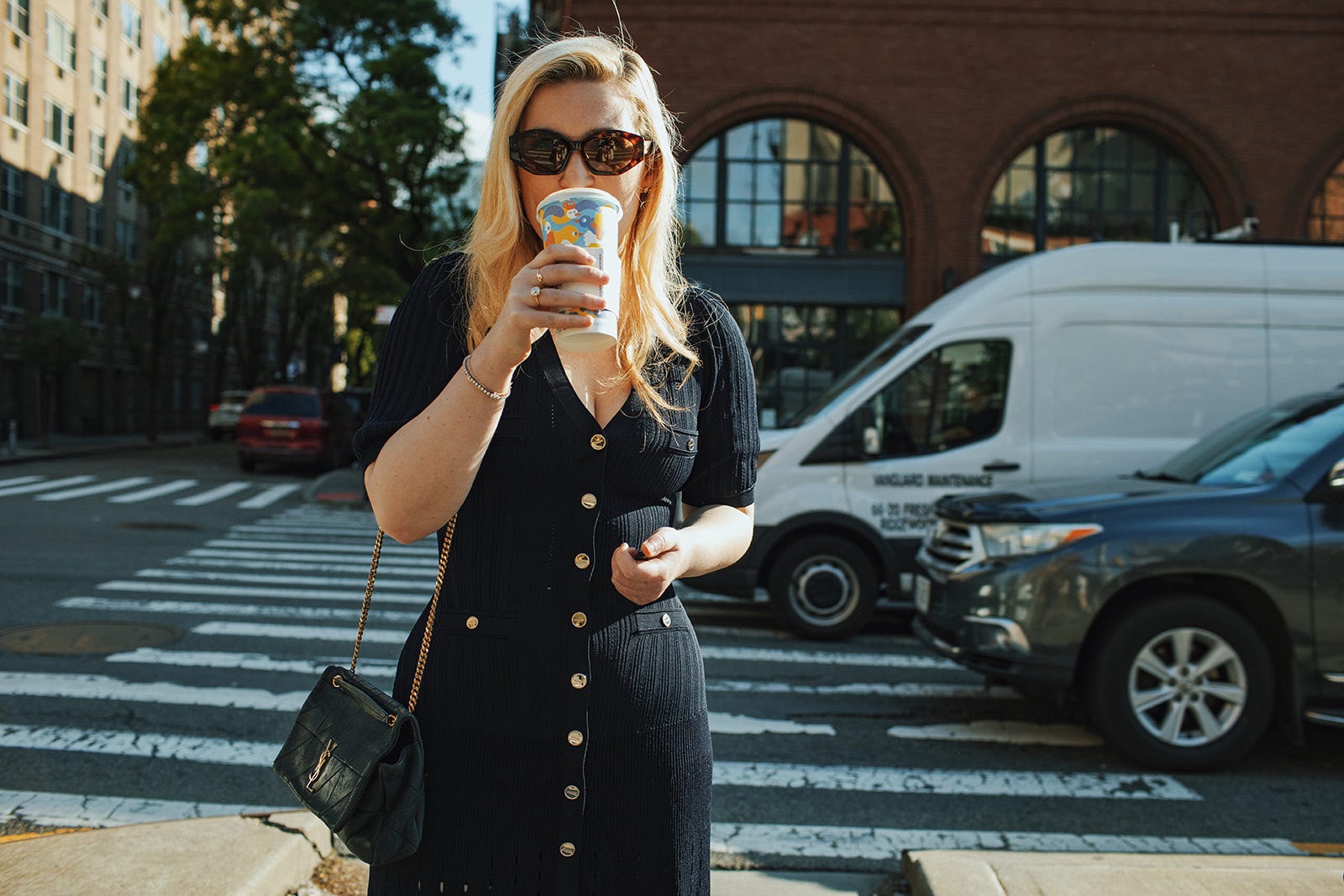
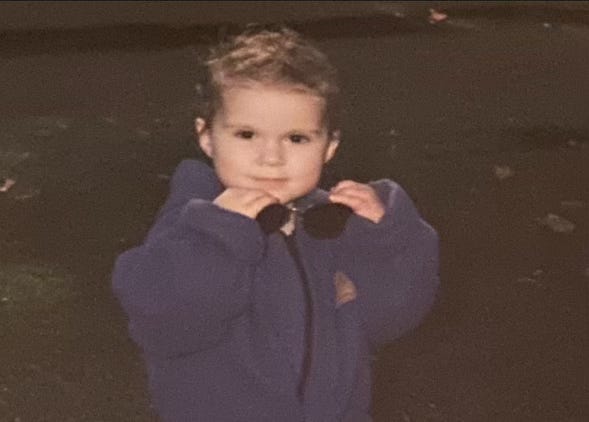
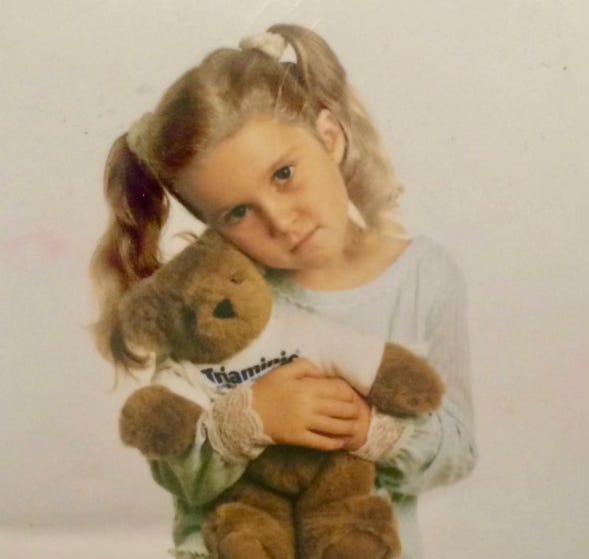
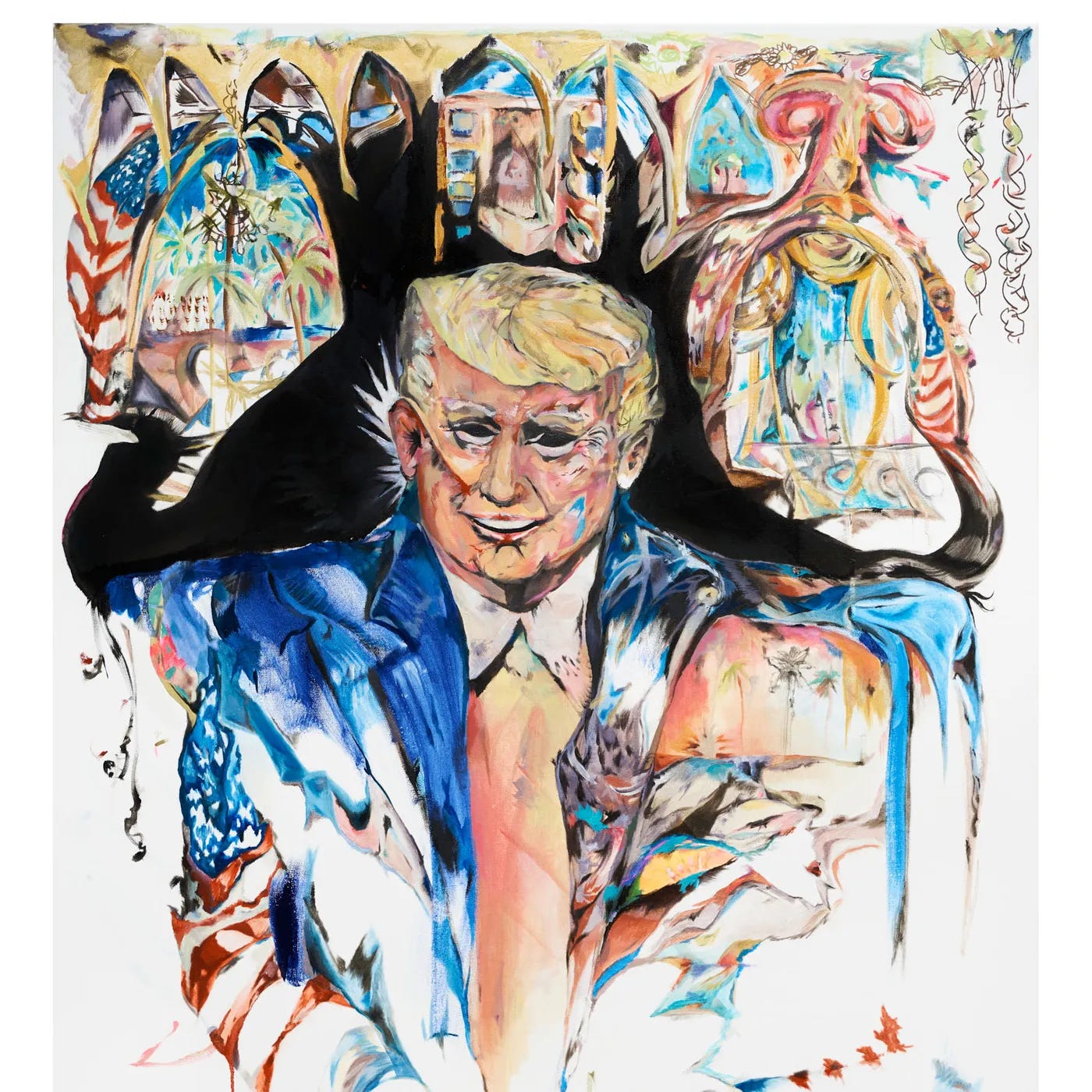
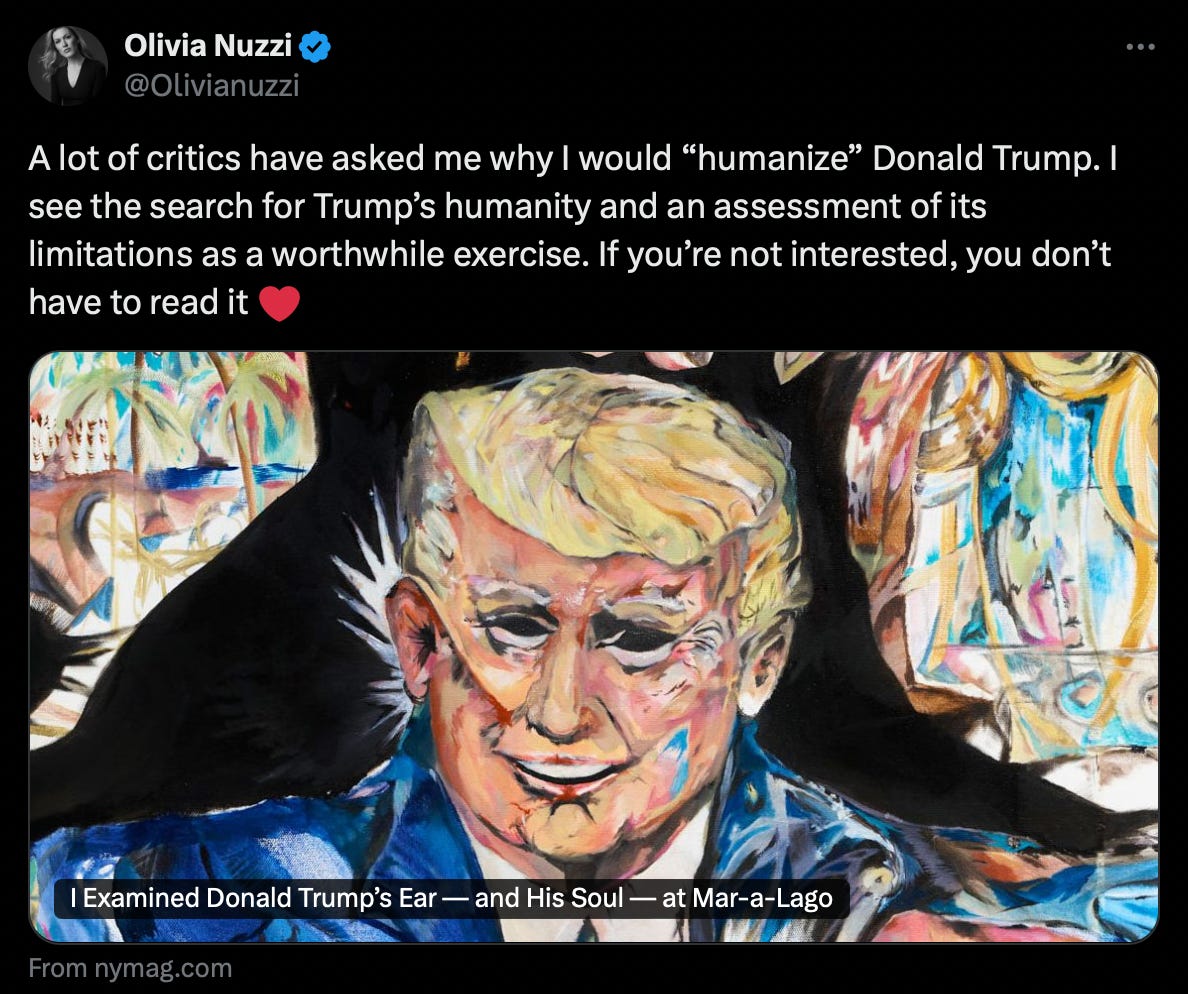
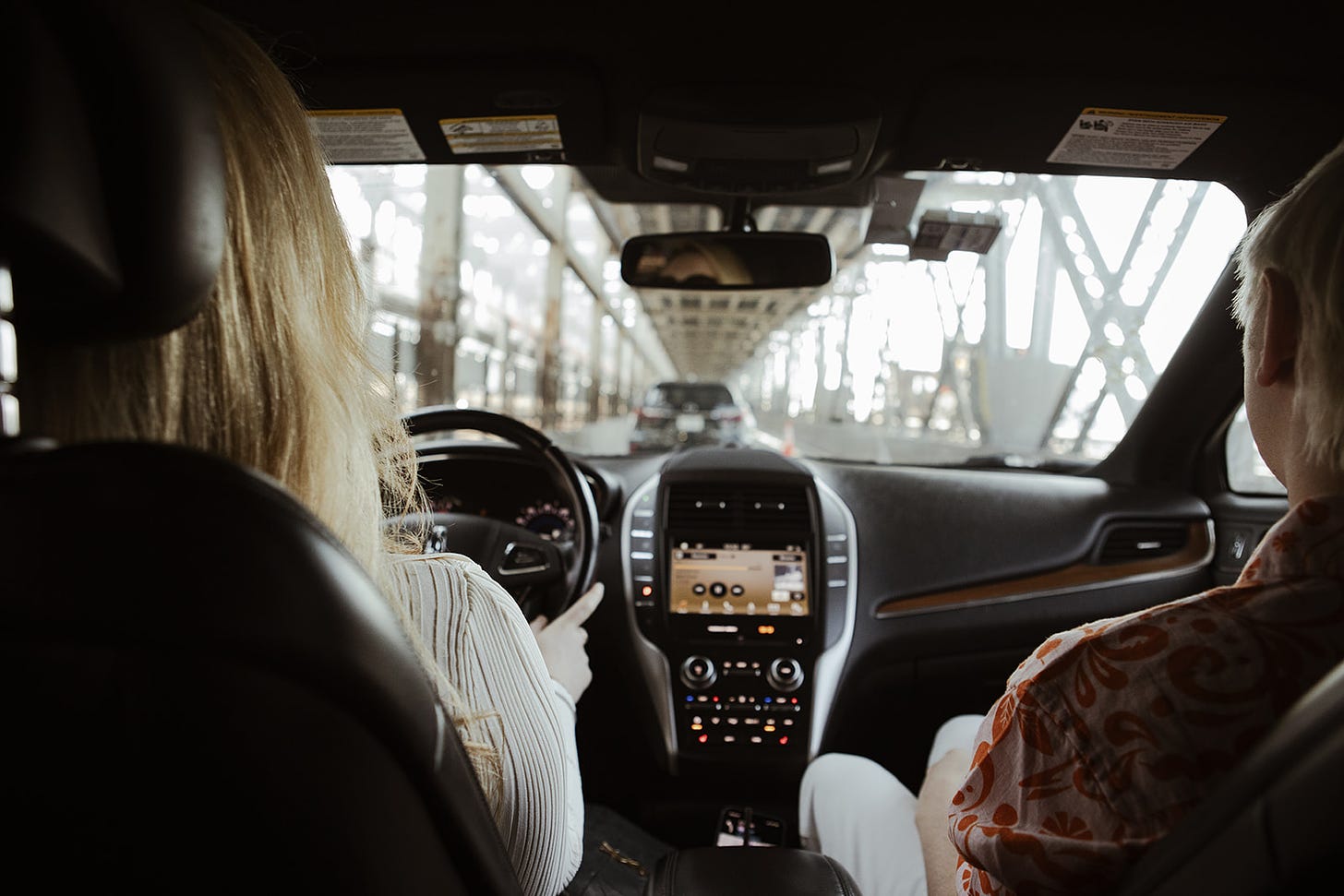
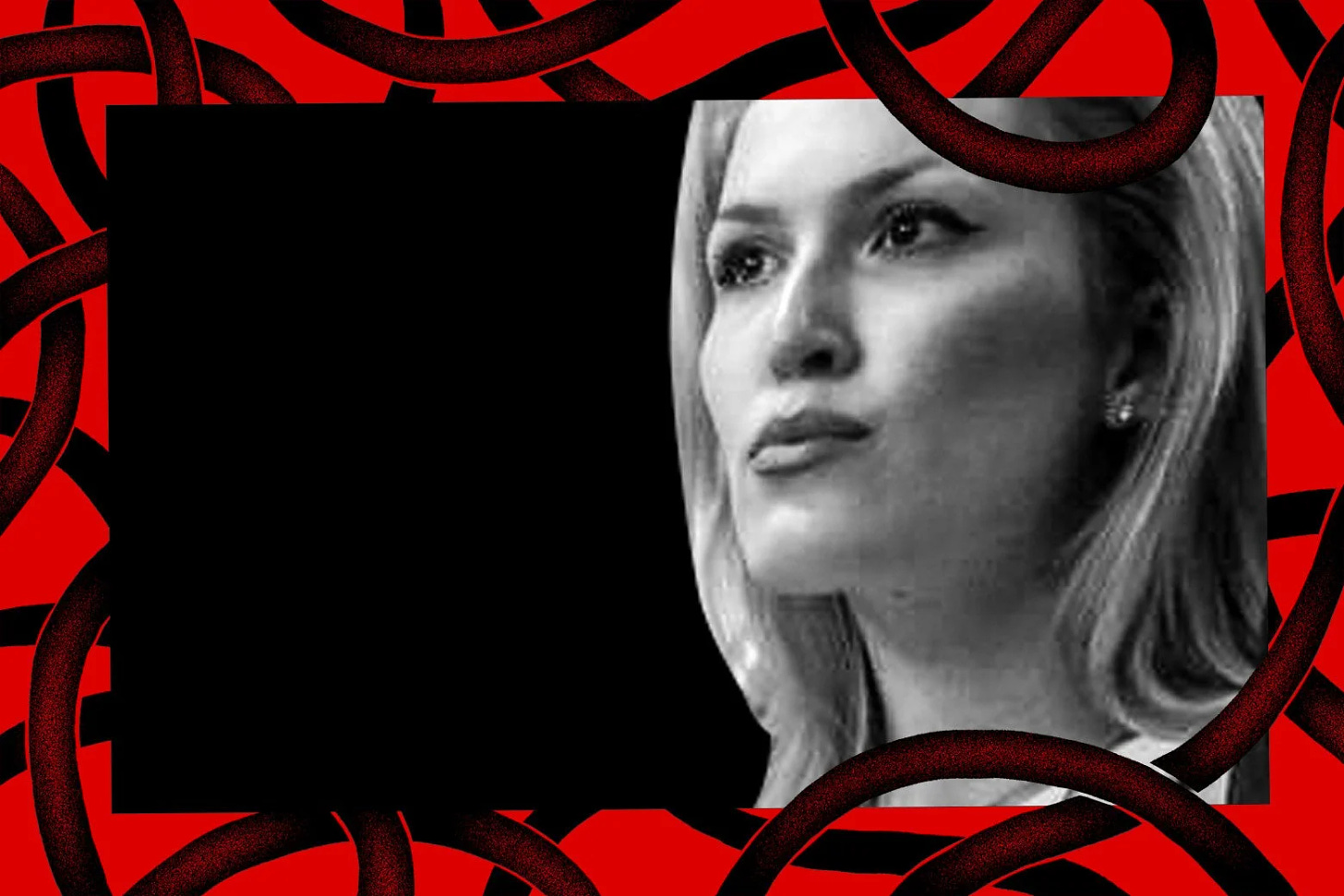
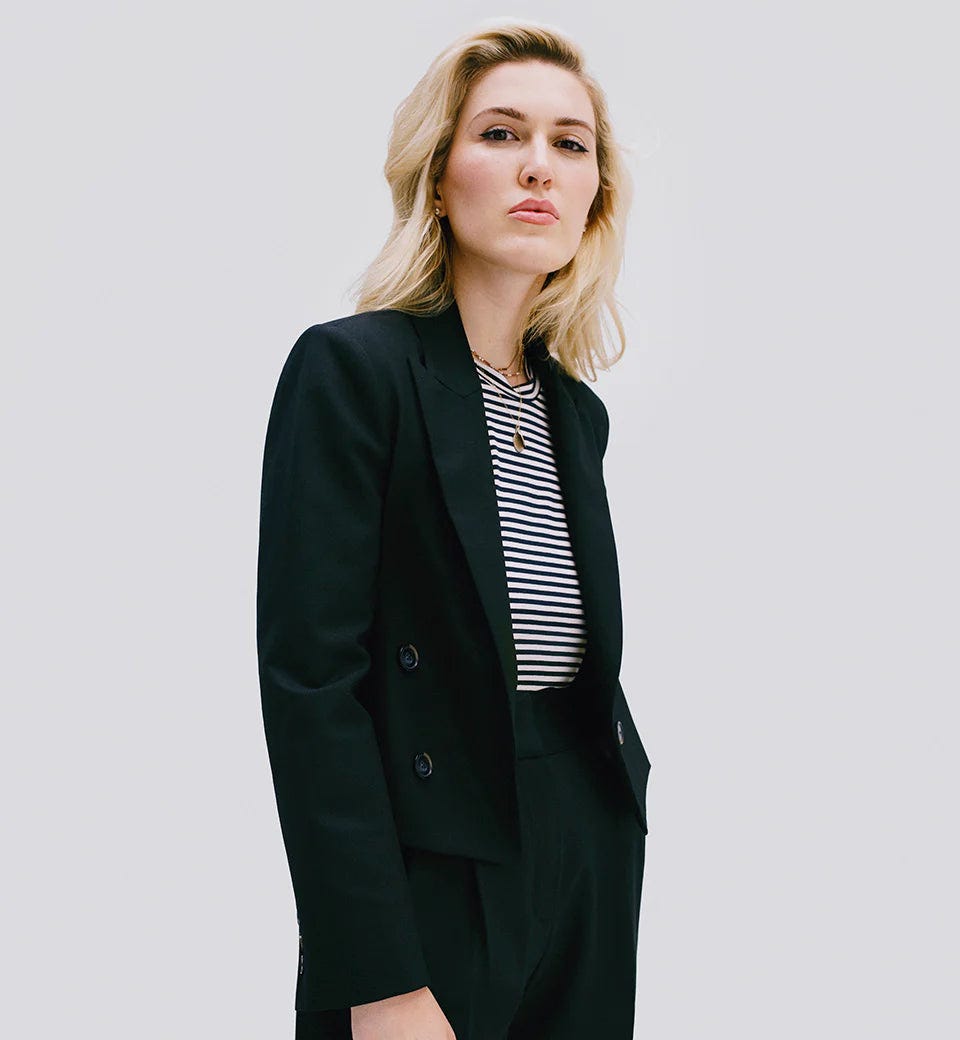
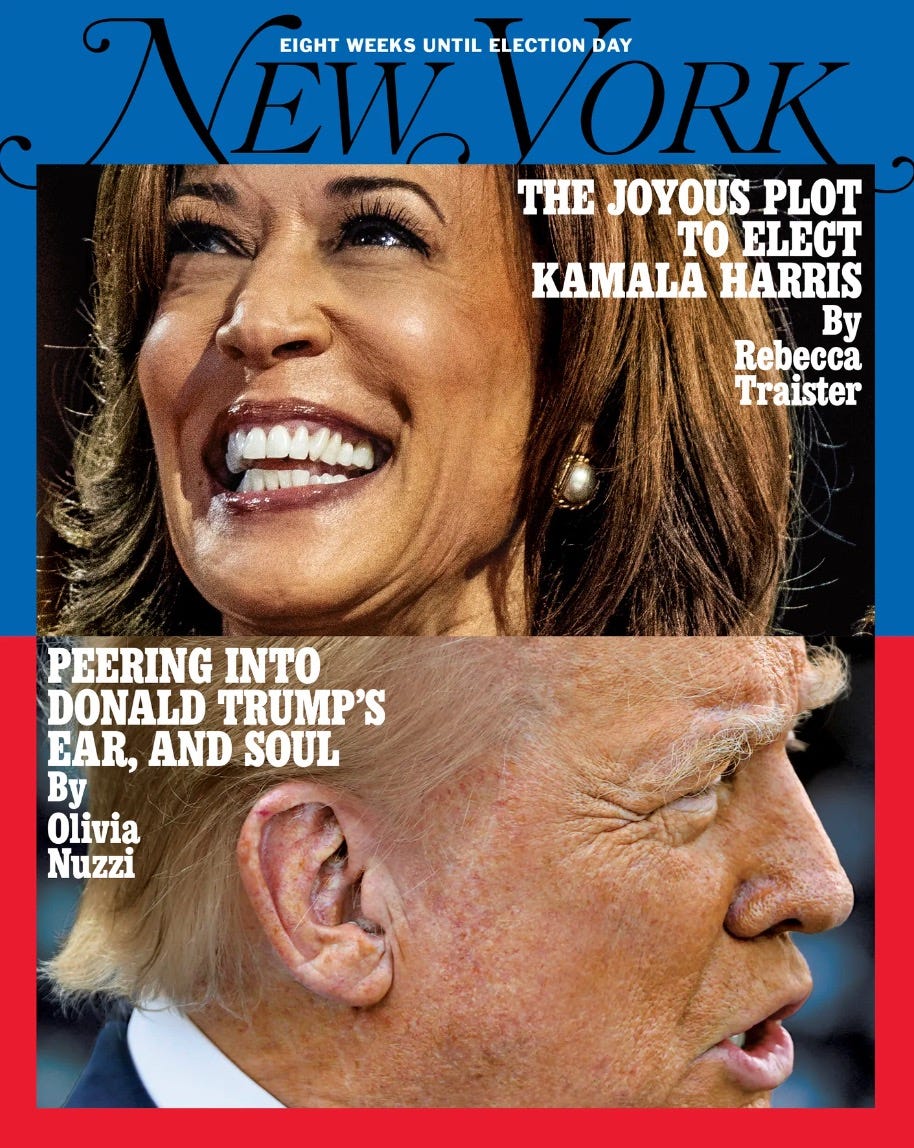
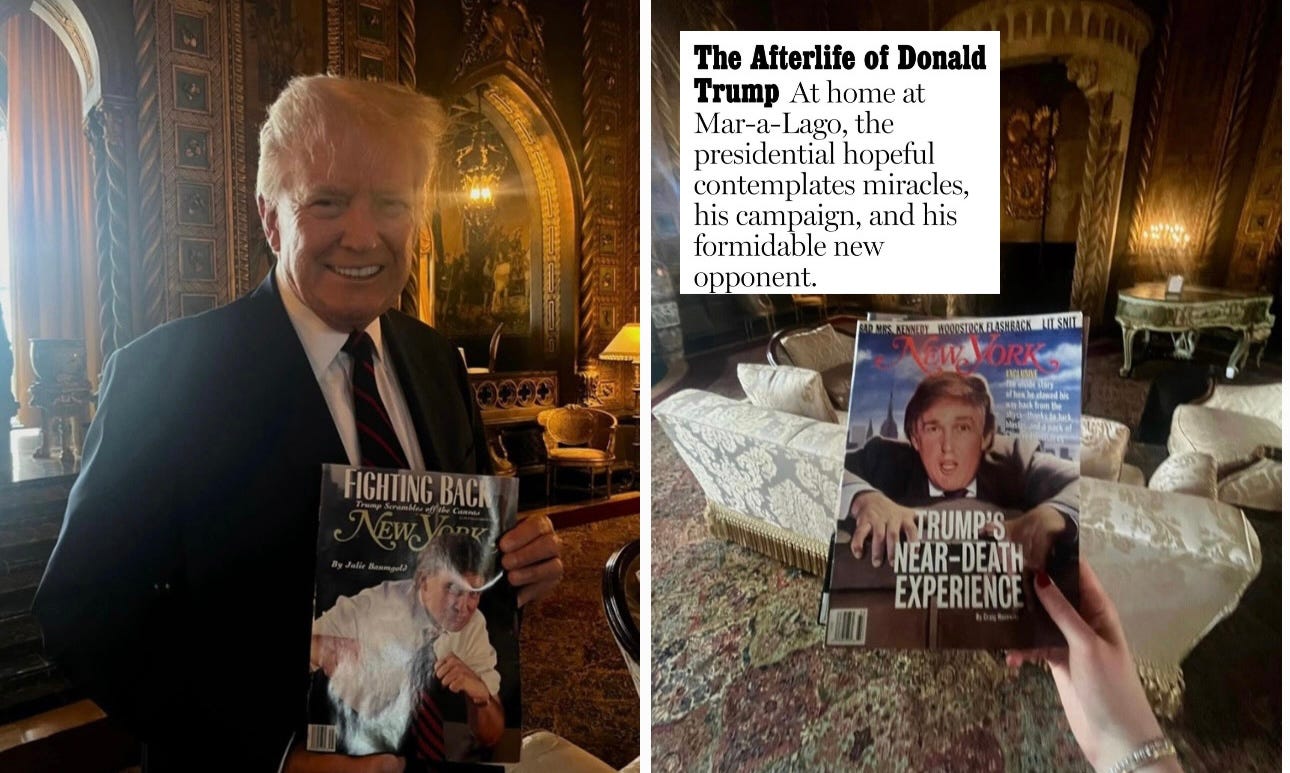
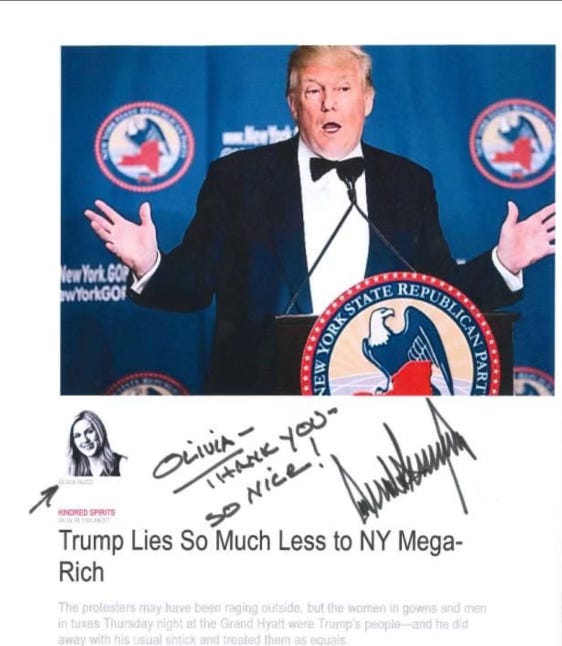
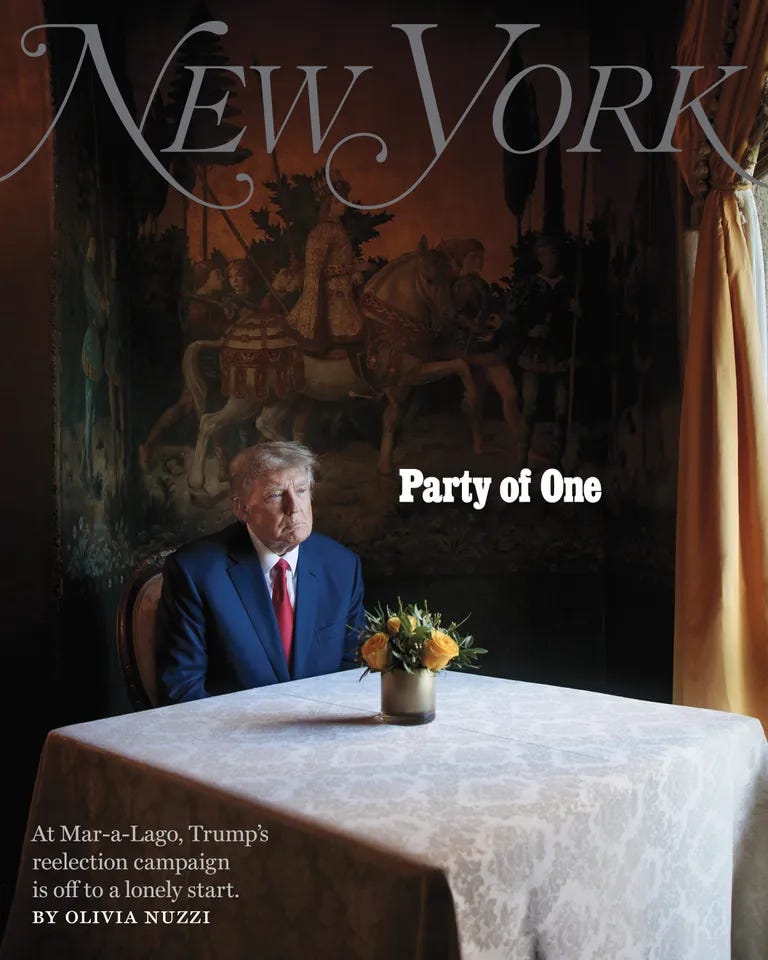
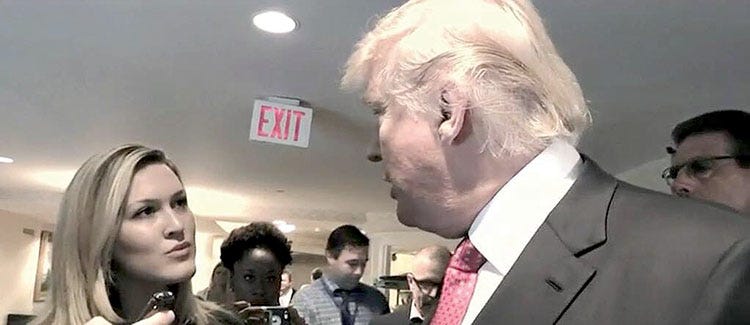
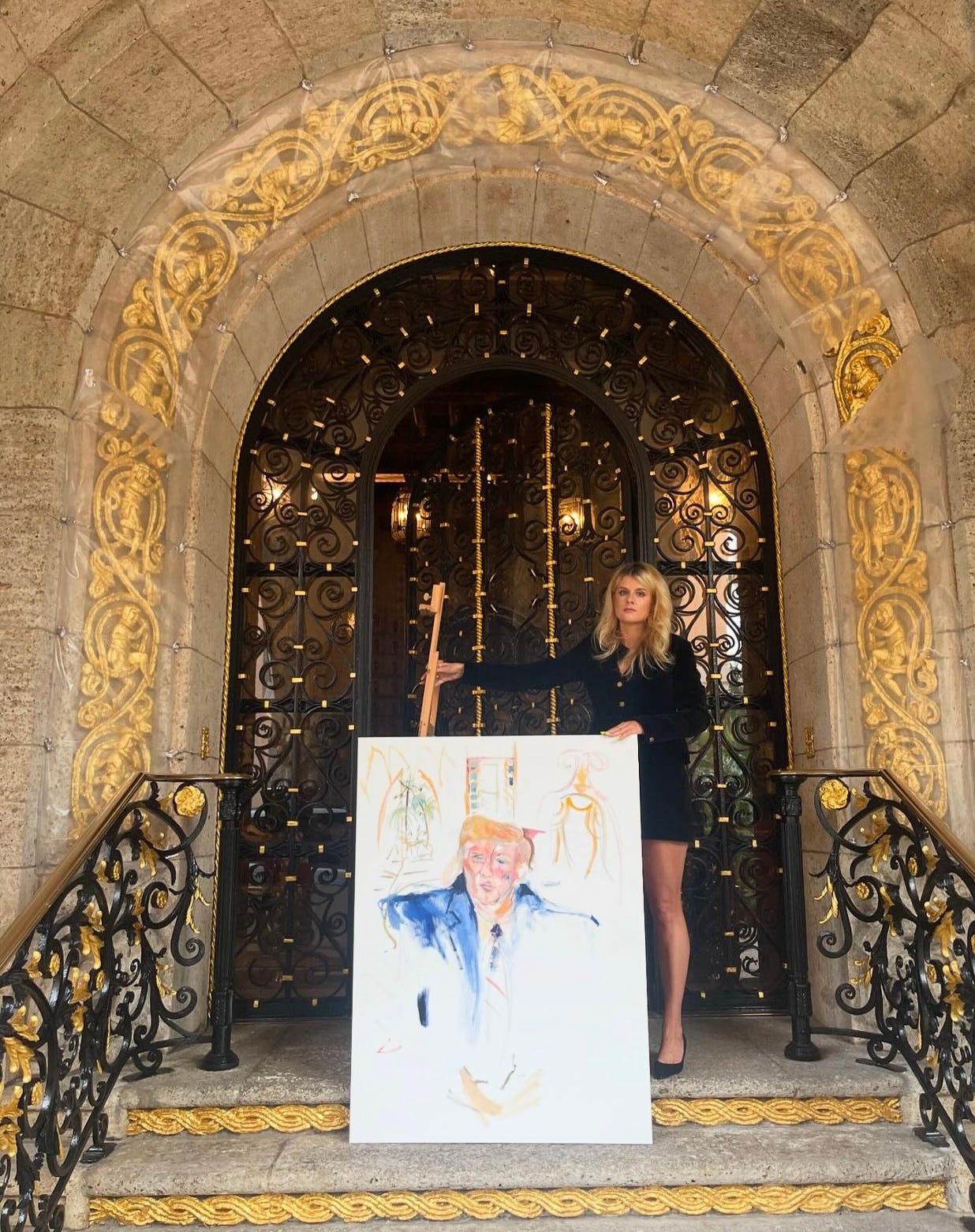
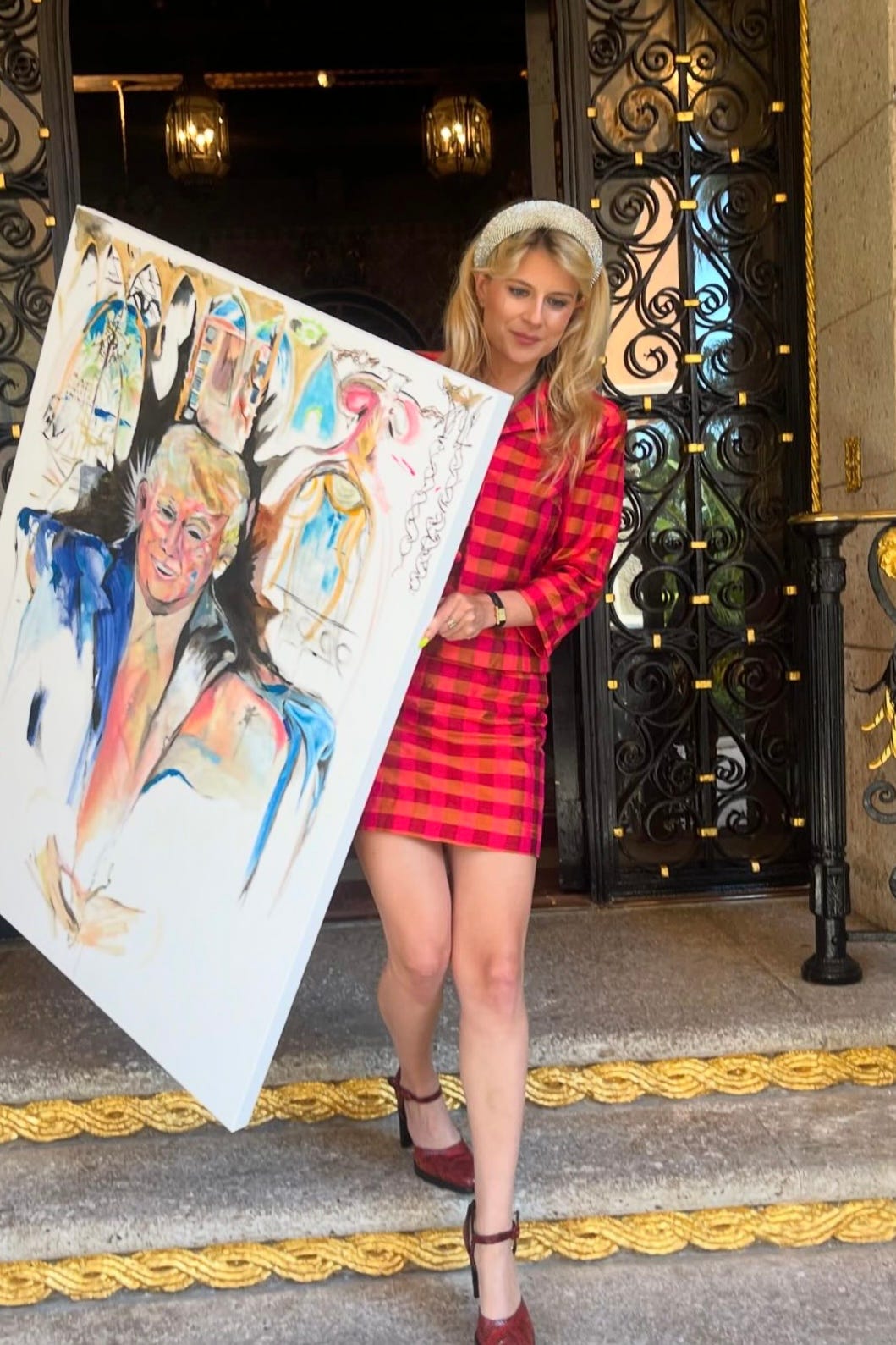
OK, now that the news has broken about Nuzzi and RFK am I sounding like a crazy conspiracy theorist to wonder if she was some kind of plant from the Dems to tank Trump’s campaign once RFK came aboard?
Well my day is already an hour behind schedule 😊